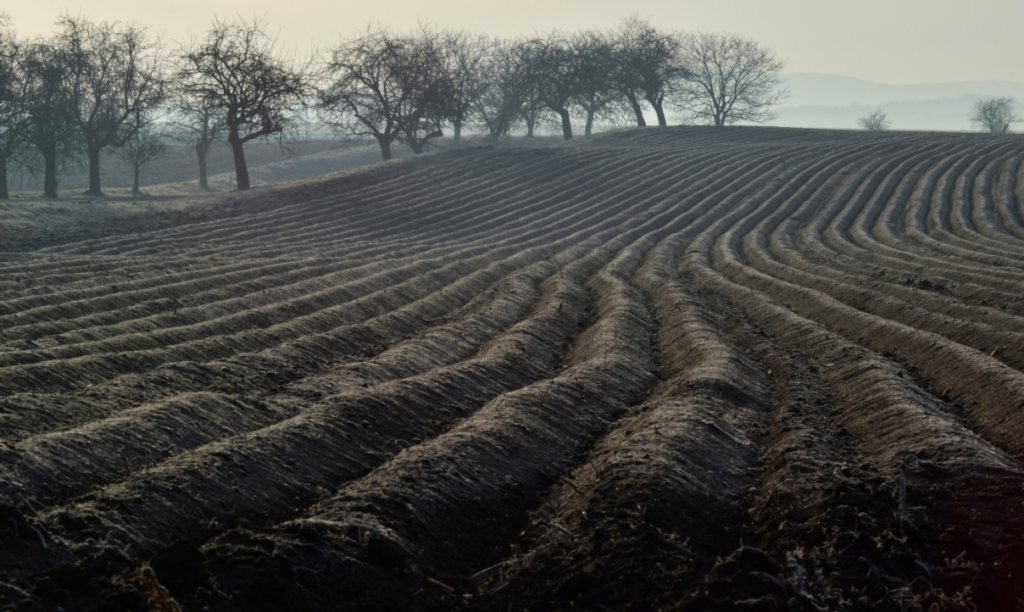Ploughing song
(Poet's title: Pflügerlied)
Set by Schubert:
D 392
[March 1816]
Part of The Theresa Grob Album
Arbeitsam und wacker,
Pflügen wir den Acker,
Singend auf und ab.
Sorgsam trennen wollen
Wir die lockern Schollen,
Unsrer Saaten Grab.
Auf- und abwärts ziehend
Furchen wir, stets fliehend,
Das erreichte Ziel.
Wühl, o Pflugschaar, wühle!
Außen drückt die Schwüle,
Tief im Grund ist’s kühl.
Neigt den Blick zur Erde,
Lieb und heimlich werde
Uns ihr dunkler Schoß:
Hier ist doch kein Bleiben;
Ausgesät zerstäuben
Ist auch unser Los.
Säet, froh im Hoffen,
Gräber harren offen,
Fluren sind bebaut;
Deckt mit Egg’ und Spaten
Die versenkten Saaten,
Und dann: Gott vertraut!
Gottes Sonne leuchtet,
Lauer Regen feuchtet
Das entkeimte Grün.
Flock, o Schnee, und strecke
Deine Silberdecke
Schirmend drüber hin!
Ernten werden wanken,
Wo nur Körner sanken;
Mutter Erd’ ist treu.
Nichts wird hier vernichtet,
Und Verwesung sichtet
Nur vom Keim die Spreu.
Die vor uns entschliefen,
Schlummern, in die Tiefen
Ihrer Gruft gesät;
Länger wird es säumen,
Bis die Gräber keimen,
Gottes Saat ertsteht!
Wer um Tote trauert,
Glaub es, ewig dauret
Nicht der Aussaat Zeit.
Aus enthülster Schale
Keimt im Todestale
Frucht der Ewigkeit!
Hard-working and honest
We plough the field,
Singing there and back.
We want to be careful as we separate
The loose clumps of soil,
The grave for our seeds.
By dragging up and down
We make furrows, always turning our back on
The destination we have reached.
Dig, you ploughshare, dig!
Out in the open, the muggy weather weighs us down
But it is cool deep in the ground.
Turn your eyes to the earth,
It will become loving and homely
For us – the earth’s dark womb;
For here there is no staying on –
Once sown everything turns to dust –
That is also our fate.
Sow, be cheerful in hope;
Graves are lying open in wait,
The fields have been cultivated;
Use the harrow and spade to cover
The falling seeds,
And then: trust in God!
God’s sun sheds light,
Mild rains dampen
The sprouting green shoots.
Settle, snow, and stretch out
Your silver covering
As a protection over them!
Harvesters are going to be swaying
Where mere grains sank,
Mother Earth is faithful.
Nothing is going to be annihilated here
And decay’s only role is to sift
The wheat from the chaff.
Those who have fallen asleep before us
Are slumbering in the depths,
Having been sown in their tomb;
It is going to take some more time
Before these graves sprout
And God’s seed rises!
For those mourning the dead,
Believe it, it is not going to last for ever
This time of sowing.
Out of the broken husk
There will be a sprouting in the valley of death,
Producing the fruit of eternity!
All translations into English that appear on this website, unless otherwise stated, are by Malcolm Wren. You are free to use them on condition that you acknowledge Malcolm Wren as the translator and schubertsong.uk as the source. Unless otherwise stated, the comments and essays that appear after the texts and translations are by Malcolm Wren and are © Copyright.
☙
Themes and images in this text:
Corn and cornfields Covers and covering Digging Dust The earth Eternity Fields and meadows Fleeing Fruit Gazes, glimpses and glances Germination, shoots and sprouting Graves and burials Green Harvest High, low and deep Home (Heimat) Hope Lap, womb (Schoß) Ploughing Pulling and dragging Rain Resurrection Seeds Silver Sleep Snow The sun Swaying and swinging Valleys Workers and working songs

The workers singing this song are involved in the most basic of human activities if we live in a society that depends on farming (i.e. all of us except hunter-gatherers). Even the verb ‘to act’ derives from the same root as the word ‘agriculture’, which is cognate with the German noun ‘ein Acker’ (a field) and the English measure of land, ‘the acre’, traditionally defined as ‘as much as a yoke of oxen could plough in a day’ (Shorter Oxford English Dictionary). The workers’ connection with the earth is not only related to the production of food, but they are also acting out that other most basic of roles in human culture: they are grave-diggers. Both humans and seeds are buried in the hope of later germination and a future harvest.
The corpses / seeds underground can be envied: they are in the cool, away from the sultry weather, where the repetitive, relentless back and forth work with the plough can sometimes appear futile. However, this endless cycle of sowing and reaping, death and resurrection, is something that we can also accept ‘cheerfully’. According to the poet, we can justifiably ‘hope’ that the seeds we plant will sprout and yield a crop. A similar faith can reassure us that those who have died will similarly sprout into new life when spring comes around. Some of us are still in mourning, though: all that we see is a snow-covered wintry landscape and it is hard to believe that what is lying beneath the frozen earth is anything other than the ‘husk’ of what was once alive.
☙
Original Spelling Pflügerlied Arbeitsam und wacker, Pflügen wir den Acker, Singend, auf und ab. Sorgsam trennen wollen Wir die lockern Schollen, Unsrer Saaten Grab. Auf und abwärts ziehend Furchen wir, stets fliehend, Das erreichte Ziel. Wühl', o Pflugschaar, wühle; Aussen drückt die Schwüle Tief im Grund' ists kühl. Neigt den Blick zur Erde, Lieb und heimlich werde Uns ihr dunkler Schooß; Hier ist doch kein Bleiben; Ausgesät zerstäuben Ist auch unser Loos. Säet, froh im Hoffen; Gräber harren offen, Fluren sind bebaut; Deckt mit Egg' und Spaten Die versenkten Saaten, Und dann: Gott vertraut! Gottes Sonne leuchtet; Lauer Regen feuchtet Das entkeimte Grün! Flock', o Schnee, und strecke Deine Silberdecke Schirmend drüber hin! Ernten werden wanken, Wo nur Körner sanken; Mutter Erd' ist treu. Nichts wird hier vernichtet, Und Verwesung sichtet Nur vom Keim' die Spreu. Die vor uns entschliefen, Schlummern in die Tiefen Ihrer Gruft gesät; Länger wird es säumen, Bis die Gräber keimen, Gottes Saat ertsteht! Wer um Todte trauert, Glaub' es, ewig dauret Nicht der Aussaat Zeit. Aus enthülster Schaale Keimt im Todesthale Frucht der Ewigkeit!
Confirmed by Peter Rastl with Schubert’s source, Gedichte von J. G. von Salis. Neueste Auflage. Wien 1815. Bey B. Ph. Bauer, pages 105-107; with J. G. von Salis Gedichte. Dritte vermehrte Auflage. Zürich, bey Orell, Gessner, Füssli & Comp. 1797, pages 96-98; with Gedichte von J. G. von Salis. Neue Auflage. Zürich, bey Orell Füßli und Compagnie. 1808, pages 113-115; and with Lyrische Anthologie. Herausgegeben von Friedrich Matthisson. Fünfzehnter Theil. Zürich 1806, bey Orell, Füssli und Compagnie, pages 59-61.
To see an early edition of the text, go to page 105 [119 von 192] here: http://digital.onb.ac.at/OnbViewer/viewer.faces?doc=ABO_%2BZ160622604


